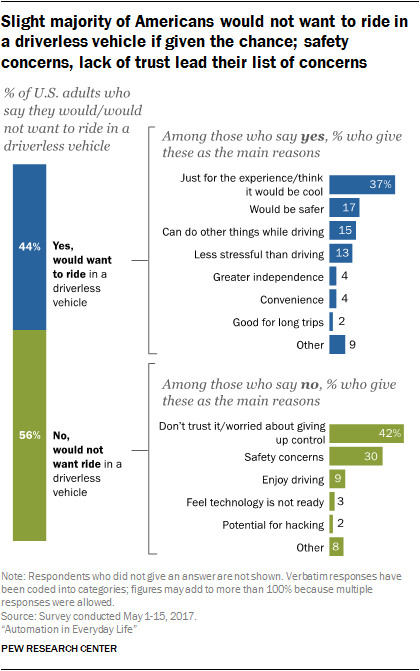Day by day about 100 individuals die in automobile crashes on U.S. roads. That dying toll is a significant purpose why each Congress and the Trump administration are backing automotive efforts to develop and deploy self-driving vehicles as rapidly as attainable.
Nonetheless, officers’ eagerness far exceeds the diploma to which the general public views this as a severe concern, and overestimates the general public’s willingness to see its driving patterns radically altered. As these of us concerned in research of expertise and society have come to know, foisting a technical repair on a skeptical public can result in a backlash that units again the trigger indefinitely. The backlash over nuclear energy and genetically modified organisms are exemplary of the issues that come up from speeding expertise within the face of public fears. Public security on the roads is just too vital to likelihood client backlash.
I like to recommend trade, authorities and customers take a extra measured and incremental method to full autonomy. Initially emphasizing applied sciences that may help human drivers – moderately than the skills of vehicles to drive themselves – will considerably delay the day all these lives are saved on U.S. roads. However it can begin saving some lives straight away, and is extra more likely to keep away from mass rejection of the brand new expertise.
Not so quick
Most Individuals are detached to what officers and security advocates see as a major problem. They react in horror to the deaths of even just a few dozen passengers in a comparatively rare airline crash however assume little in regards to the 100 lives misplaced each day from driving. The rewards from driving, reminiscent of private freedom and comfort, overwhelm fears. The truth is, most individuals imagine their driving expertise are higher than common, making them extra more likely to assume they’ll keep away from the tragedies that befall others.
Consequently, the push for autonomous driving on the idea of improved security is an answer to a state of affairs the general public doesn’t contemplate a major problem. We all know from the research of psychologist Paul Slovic that the general public may be very uncomfortable with novel applied sciences that cede human management to machines. That is significantly true, in a phenomenon known as “betrayal aversion,” when the advantages of applied sciences are overpromised and actuality doesn’t seem like per these expectations. Except self-driving vehicles can dramatically cut back fatalities, the general public could stay skeptical.
Severe security considerations
Surveys present the American public is way from offered on the protection advantages of autonomous autos. A latest survey by the Pew Analysis Heart revealed that greater than half of the American public can be frightened about using in an autonomous car as a consequence of considerations over security and the shortage of management.
One other survey discovered that solely 15 % of individuals would like autonomous autos to conventional human-driven vehicles. It’s true that some teams (males, individuals with extra schooling and folks beneath 45) are much less frightened than others, however these variations of opinion are much less vital than the general public view. Apart from merely the concern of being in these autos with out the choice of management, a lot of the American public nonetheless relishes the enjoyment of the driving expertise.
Public fears could ease as individuals turn into aware of self-driving vehicles, however this expertise must be gained regularly over time. The psychological chasm between having full management over the car to the entire absence of management is large. Shopper advocates are already warning public officers that federal legal guidelines and guidelines designed to hasten the motion to autonomy are too permissive, and threat triggering a public backlash.
A gentle stream of crashes, each severe and minor, would merely reinforce public fears that self-driving vehicles usually are not protected. The media, delicate to those fears, might be desirous to cry betrayal when there’s a contradiction between these accidents and the expertise’s rationale. And politicians, eager to be seen as protectors of public well being, could promote a brand new “Make America Drive Once more” motion.
To keep away from public backlash or overreaction, trade and authorities mustn’t rush, however moderately transfer extra intentionally towards deploying totally autonomous vehicles on U.S. roads. There’s nonetheless a lot the trade can do by way of cutting-edge expertise to help drivers. Improvements reminiscent of adaptive cruise management and automated emergency braking have already got appreciable public help and can work to acclimate the general public to extra superior phases of driver autonomy.
Authorities and trade are proper to proceed inventing and innovating applied sciences that may contribute to autonomous autos. However moderately than racing to get self-driving vehicles on U.S. roads, they need to gradual the rollout right down to a tempo the general public can regulate to. That method, the protection advantages might be each actual and long-lasting.


